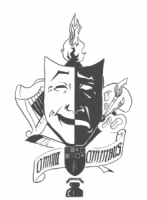
Fall Production:
The story of Alexander Graham Bell turns out to be a much more complex and certainly more interesting one than is indicated by the ultimately boring phrase, “the inventor of the telephone.” This play raises questions about where that credit is actually due, and reveals why Bell, a generally sincere fellow, was so urgently motivated that he perhaps implemented some questionable practices.
The idea of having a year of plays written by Heights faculty, students, and alumni had always seemed interesting. Sometimes, as I dug through piles of scripts looking for plays that checked all the boxes, I thought a season of suddenly authored plays might be a last minute necessity. But this time around I knew it would be an exciting experiment, neither sudden nore last minute, but well-founded and developed. That assurance came from my knowledge of the enterprise and dedication already shown by several members of our community, including Graham’s playwright, Joaquin Bucheli. Joaquin’s range of experience with drama at and outside the Heights, as well as his ongoing forays into script writing on historical events and figures, were compelling reasons enough. When I saw his composition and storytelling for Graham, particularly his use of the flashback/flash forward structure, I was convinced that this is something our audience should see. I hope you enjoy the show, and thank you for being a part of the Heights Authors Showcase!
Learn MoreDrama and the arts are an essential part of a well-rounded education. The positive effects of drama education are well-documented, and include confidence, communication skills, self-discipline, sympathy for others, and imaginative insight into life. Educational theatre is unique among taught subjects because it makes the enactment and cohesion of all these traits a primary objective.
In addition to the development of these character traits, Heights drama seeks to accomplish three things:
- to lead students to a full and refined creative expression;
- to inspire students to become simultaneously true Christians and true artists;
- to serve our community by becoming “Omnia Omnibus”: all things to all people.
First, creative expression. Ex-pression is a pushing-out. A seed breaks out of the earth. A child breaks forth from the womb. Ex-pression is growth into the fullness of life, and education in expression encourages and refines that growth. Creativity is humanity’s attempt to imitate the Creator of all things, not ex nihilo, but as recreation. Both expression and creativity must be directed and refined to achieve the fullest growth.
Second, complementary and simultaneous Christian and artistic life. Christianity and artistry seem to have gone separate ways in our society. Christian attempts at art (in song and film, especially) are often cliché and saccharine, and the artistic and theater communities often spurn Christianity. Education in creative expression, in our profoundly Christian community, is hopefully a small movement toward bridging that gap.
Third, “Omnia Omnibus”. Performance and creative design are either selfless or selfish. An actor or designer can create in order to gratify his own desire for applause, or he can be making a sincere attempt to give the audience a beautiful gift, tended and developed over several months of committed work. Drama students at The Heights should give themselves to this project. Becoming “Omnia Omnibus”, we hope to serve and inspire whomever is in our audience and in our community.
 The Omnibus Players crest is blazoned as follows, in accordance with traditional heraldic terminology:
The Omnibus Players crest is blazoned as follows, in accordance with traditional heraldic terminology:
Upon a lozenge sable, a mask parti per pale, dexter a
mourning visage sable, sinister a jovial face argent;
on the crest a burning flame argent; all supported by
dexter a palette and brushes, sinister a harp, all argent;
at the base a Heights crest and motto, and
a quill and ink of the colors, with the
motto inscribed ‘Omnia Omnibus.’
The different elements of the crest symbolize the different elements of a theatrical production. The central mask represents the paradoxical union of joy and grief as essential aspects of the human experience. The mask also represents mysterious and hidden truth. The crest has written words as its base, just as plays are based on written language. “Omnia Omnibus,” or “All things to all men,” is St. Paul’s description of the Christian mission here on earth, and also an appropriate motto for an actor, who assumes many disguises in order to touch and inspire all audiences. The palette and the harp respectively represent the visual and the aural aspects of theater. The burning flame upon the top stands for the physical movement that enlivens each performance and makes drama a unique art form. The tongue of fire is also a symbol of the Holy Spirit, the Christian Muse, who inspires each artist with a true and loving vision of human life.